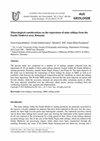Macroeconomic Dimensions in the Clusterization Processes: Lithuanian Biomass Cluster Case
Q4 Mathematics
Analele Stiintifice Ale Universitatii Al I Cuza Din Iasi - Matematica
Pub Date : 2017-01-01
DOI:10.1515/aicue-2017-0003
引用次数: 0
Abstract
Abstract The Future production systems’ increasing significance will impose work, which maintains not a competitive, but a collaboration basis, with concentrated resources and expertise, which can help to reach the general purpose. One form of collaboration among medium-size business organizations is work in clusters. Clusterization as a phenomenon has been known from quite a long time, but it offers simple benefits to researches at micro and medium levels. The clusterization process evaluation in macroeconomic dimensions has been comparatively little investigated. Thereby, in this article, the clusterization processes is analysed by concentrating our attention on macroeconomic factor researches. The authors analyse clusterization’s influence on country’s macroeconomic growth; they apply a structure research methodology for clusterization’s macroeconomic influence evaluation and propose that clusterization processes benefit macroeconomic analysis. The theoretical model of clusterization processes was validated by referring to a biomass cluster case. Because biomass cluster case is a new phenomenon, currently there are no other scientific approaches to them. The authors’ accomplished researches show that clusterization allows the achievement of a large positive slip in macroeconomics, which proves to lead to a high value added to creation, a faster country economic growth, and social situation amelioration.集群化过程中的宏观经济维度:立陶宛生物质集群案例
未来生产系统的重要性日益增加,这将要求工作不是保持竞争,而是保持协作的基础,集中资源和专业知识,这有助于达到一般目的。中型企业组织之间的一种协作形式是在集群中工作。集群化作为一种现象早已为人所知,但它对微观和中等层面的研究提供了简单的好处。宏观经济维度的集群化过程评价研究相对较少。因此,本文将重点放在宏观经济因素的研究上,分析集群化的过程。分析了集群化对国家宏观经济增长的影响;他们将结构研究方法应用于集群的宏观经济影响评价,并提出集群过程有利于宏观经济分析。通过实例验证了聚类过程的理论模型。由于生物量集群是一种新现象,目前还没有其他的科学方法来研究它。作者的研究成果表明,集群化可以实现宏观经济的大正滑移,从而提高创造附加值,加快国家经济增长,改善社会状况。
本文章由计算机程序翻译,如有差异,请以英文原文为准。
求助全文
约1分钟内获得全文
求助全文
来源期刊
CiteScore
0.70
自引率
0.00%
发文量
2
审稿时长
>12 weeks
期刊介绍:
This journal is devoted to the publication of original papers of moderate length addressed to a broad mathematical audience. It publishes results of original research and research-expository papers in all fields of mathematics.

 求助内容:
求助内容: 应助结果提醒方式:
应助结果提醒方式:


